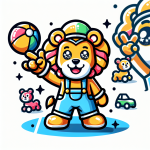Whether you're a parent, caregiver, or educator, providing engaging toys and activities is an important part of promoting a child's development. Today, DIY (Do-It-Yourself) toys have taken center stage in the pursuit of developing children's cognition and socio-emotional skills. Coupled with the digital eras convenience and accessibility, several online platforms are offering essential resources for child care, development, and DIY toys. This article explores the benefits of DIY toys and the platforms one can leverage to access resources about the same.
The Importance of DIY Toys in Child Development
DIY toys are an excellent way to enhance a child's development. Firstly, they provide a platform for the application of creativity and imagination, key factors in cognitive development. In addition, DIY toys also encourage fine motor skills development through activities like cutting, threading, and folding. Lastly, DIY toys foster emotional skills as children learn about patience, perseverance, and accomplishment, traits that are invaluable for their future.
Online Platforms Providing Essential Resources for DIY Toys
As we move deeper into the digital age, a proliferation of online platforms is offering a slew of resources for child care, development, and DIY toys. Lets explore some of the most impactful online resources.
1. Pinterest:
Pinterest is a phenomenal source of DIY toy ideas and child development resources. The platform is teeming with images, tutorials, and inspiration for various DIY projects aimed at children of various age groups. This ranges from sensory toys for toddlers to educational games for older children. Moreover, Pinterest enables you to 'pin' your favorite projects for future reference, effectively organizing your child development resources.
2. Udemy:
Udemy is known for its diverse range of online courses, and it doesn't disappoint when it comes to child development and DIY toys. Several courses on the platform provide resources and tutorials on making DIY educational toys. These courses often include expert advice, step-by-step video tutorials, and other resources to enrich your ability to make effective DIY toys.
3. DIY.org:
A platform made specifically for children, DIY.org provides a range of fun and educational projects that children can do at home. The platform combines the fun of DIY projects with learning objectives to ensure your child is not only entertained but also learning. Some of these projects include DIY toys that can keep your child engaged while boosting their development.
4. YouTube:
YouTube hosts a wide array of videos on how to make DIY toys. These video tutorials provide an easy-to-follow guide to creating different toys. Channels like 5-Minute Crafts PLAY and TheDadLab are especially known for their innovative DIY toy ideas. The advantage YouTube offers is the visual guide which can significantly improve the learning and implementation process.
5. Facebook Groups:
Various child development and DIY toys-focused groups exist on Facebook. Platforms like DIY Kids Craft Ideas or Homemade Toys and Activities are virtual communities where parents, caregivers, and educators share creative ideas for DIY projects, activities, and toys. These groups can offer individualized advice, creative toy ideas, and a supportive community.
6. Online Blogs:
Blogs like Hands On As We Grow and Red Ted Art offer countless DIY toy ideas ranging from simple projects for young kids to more complex projects for older children. Alongside the toy projects, these blogs also explain the developmental benefits of each activity, helping caregivers understand the significance of each toy in their child's development process.
In conclusion, the combination of DIY toys and the digital platform provides a well-rounded strategy for child development. The online platforms mentioned above are sure to provide countless DIY toy ideas, skills to ensure their successful creation, and understanding of their benefits for your child's development. By leveraging these resources, caring adults can provide engaging, educational toys that not only entertain children but also actively contribute to their cognitive, physical, and socio-emotional development.


leave a comment